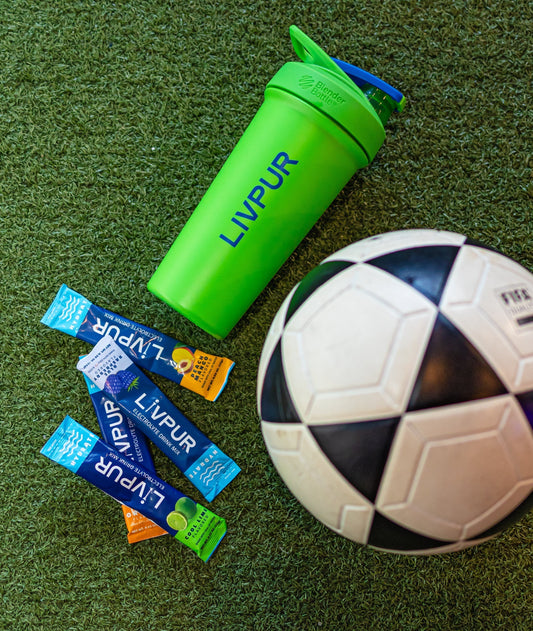Many people start feeling a bit off during the summer heat, whether it’s cramped, sluggish or fatigued. You need electrolytes to support most of your bodily functions, and it’s pretty common to not get enough of them through your diet alone. The proper electrolyte balance is especially important if you’re super active during the summer or if you’re at risk for electrolyte imbalances from dehydration or other medical conditions. We wanted to break down some of the most important things to understand about the science of electrolytes and their impacts on hydration, highlighting how LivPur Nutrition’s Hydrate checks all the boxes (and then some!)
What Are Electrolytes?
Electrolytes are essential minerals your body needs to survive. The most common types are sodium, magnesium, calcium, potassium, and chloride, and each carries an electric charge, either positive or negative, when dissolved in water. Electrolytes are all commonly found to some degree in our food. In our bodies, electrolytes can help regulate the pH levels of body fluids and support enzymatic chemical reactions across different systems of the body.
Many electrolytes impact your nerve and muscle functions. If you get muscle cramps after a hot day in the sun, it might not be because you haven’t drank enough water (at least, not directly.) Electrolytes are necessary to infuse with water for rehydration!
But we think it’s helpful to explain why your body needs the right balance of each common electrolyte. Having too much or too little of any one electrolyte can lead to some serious problems that require medical advice and supervision. So we’re starting by covering those!
Sodium
Sodium, or salt, is probably the most common of the electrolytes on our list. If you don’t have enough sodium in your blood, a condition known as hyponatremia, you may have headaches, muscle weakness, fatigue, and other issues. This used to be a widespread issue when salt was a difficult ingredient to come by, but today, most people get enough sodium through their diet.
Too much sodium, a condition known as hypernatremia, can make you thirsty and lethargic. From a medical perspective, it is a “water problem” not an issue of sodium toxicity. More severe consequences of hypernatremia include high blood pressure and loss of consciousness. This is a more prevalent issue during the summers, particularly for people who are already dehydrated or have higher sodium diets.
Potassium
Potassium is a mineral found in most vegetables and fruits. If you don’t have enough potassium in your blood, a medical condition known as hypokalemia can develop over time, which causes muscle weakness and cramping as well as an abnormal heart rate.
Hyperkalemia is the opposite condition which results from having too much potassium. It can be tricky to self-diagnose as it also can cause an irregular heartbeat, muscle weakness, and fatigue, so medical advice is always recommended if you are concerned about your potassium levels.
Magnesium
Magnesium, or vitamin K, is a mineral found in whole grains, nuts, and other hardy foods like these. It is involved in over 300 chemical reactions with enzymes in the body. If you have low levels of magnesium in your blood, it can cause tremors, numbness in hands and feet, and even strange eye movements that require medical attention.
High levels of magnesium are known to make people drowsy, lead to a low mood, and also contribute to low blood pressure over time. The most common cause of high magnesium levels is impaired kidney function, so you should speak with a doctor if this is a concern.
Calcium
Most people get enough calcium through their diets since it is available in all forms of dairy. However, some individuals cannot tolerate dairy and must rely on fruits like oranges or supplements to get enough calcium. Hypocalcemia is the medical term for a low level of blood calcium. It can lead to muscle spasms, tingling in the extremities, or even numbness in the mouth.
Hypercalcemia, a high level of calcium in the blood, can lead to excessive thirst, bone pain, weakness, confusion and digestive problems. It can be caused by serious cases of dehydration, so this is just another reason to make sure you’re rehydrating after a day in the sun.
Chloride
Most people get enough chloride through table salt, which contains both sodium and chloride. Still, certain medical conditions can result in low chloride levels. Having too little chloride can cause uncomfortable digestive issues like constipation and nausea as well as dehydration, difficulty breathing, and weakness.
On the other hand, too much chloride can lead to confusion, numbness, irregular heartbeats, and high blood pressure if the level is high enough. One of the most common causes is dehydration, but high chloride levels on a blood test could indicate kidney diseases.
How To Replenish Your Electrolytes
There are a great variety of foods and supplements that can help you replenish, rehydrate, and maintain your electrolyte levels for optimal body function. Generally speaking, we think foods are a great way to sustainably get your vital electrolytes, and supplements are best when you’re depleting those electrolytes and need a quick boost during the day.
Electrolyte Drinks
Electrolyte drinks are one of the best ways to quickly replenish your electrolytes. However, many sports drinks are overly sugary and don’t contain all of the amino acids your body needs to thrive. We recommend checking the sugar content before purchasing a regular “sports drink.”
Electrolyte powders are becoming more and more popular, probably because better options are more accessible than ever. Powders are the most effective electrolyte supplements in our opinion! The LivPur’s Hydrate formula provides every electrolyte discussed here today. Plus, the formula contains 11 essential amino acids, with only 3 grams of sugar. It’s the best way to get all the electrolytes you need without spiking your blood sugar in the afternoon!
Natural Sources Of Electrolytes
Whole, natural foods can be rich sources of electrolytes. We recommend following a well rounded diet complete with whole grains, dark leafy greens, citrus fruits, berries, and dairy products. Each of these contains many of the electrolytes you need to recover from activities and to support a healthy nervous system. Also, did you know that eating this type of diet, when pair with the right supplements, can help boost your immunity during the winter months?
Testing And When To Seek Medical Advice
Many of the issues we described are serious and require medical attention.
We always recommend seeking medical advice from a healthcare provider if you are concerned about a severe case of low or high electrolytes. They can provide blood tests that measure the relative levels of each electrolyte. Doctors can also take a look at your health history to understand what might be happening and provide direct infusions of electrolytes if you are particularly low in any one.
Why Electrolyte Balance Matters
We sincerely hope you never experience severe muscle cramps or any condition requiring medical attention because of electrolytes.
Still, keeping your electrolytes balanced supports healthy muscle contraction, nerve function, and fluid balance so that you continue feeling good as you should all summer. If you’ve ever had an off day on the golf course, hydration might be a good place to look. As we’ve discussed, electrolytes are necessary for proper hydration, and hydration is critical to your performance in sports.
Your body’s pH levels, or the acid-base balance of your body, is also regulated by the proper balance of electrolytes. One of the electrolytes not mentioned on our list, bicarbonate, is responsible for moving carbon dioxide through the bloodstream according to Medlineplus.gov.
Causes Of Electrolyte Imbalances
Many people double their water intake during the summer months, which feels like the best way to hydrate. We like to remind people that too much hydration without a good balance of mineral-rich foods or an electrolyte supplement can cause low levels of electrolytes. This can lead to dehydration over time, especially if you take in other risk factors for dehydration like diuretics such as coffee or tea, or medications prescribed for high blood pressure.
If you don’t eat a ton of leafy greens or drink naturally electrolyte-infused drinks like coconut water, electrolytes can become depleted over time. If you’re out sweating in the hot summer sun, you’re losing both water and electrolytes! With that in mind, it’s important to drink enough water to keep your body in balance. The LIVPUR Hydrate Electrolyte Drink Mix is a fantastic way to infuse your water quickly, to get all the electrolytes you need all summer long.




